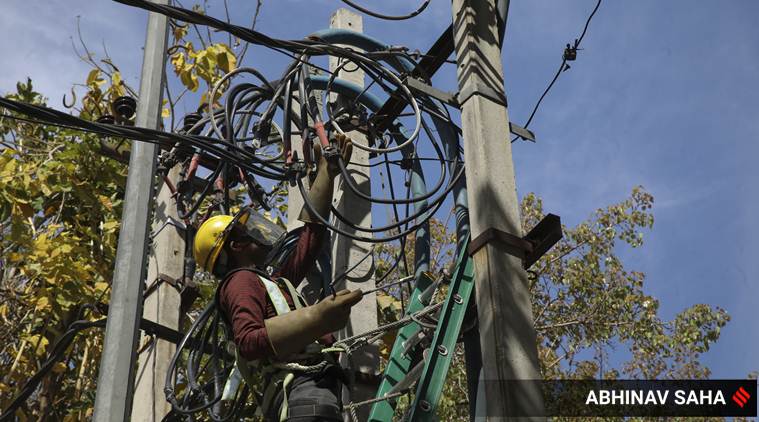 An electrician at work in the Civil Lines area during the lockdown. (Express photo by Abhinav Saha)
An electrician at work in the Civil Lines area during the lockdown. (Express photo by Abhinav Saha)
A five-minute daily briefing on “social distancing” at work, wearing special vests and helmets even while cycling to office, and maintaining a safe distance from households with home quarantine posters — COVID-19 has caused an updation of the dos and don’ts rulebook of the city’s electricity personnel.
The city’s largest power distribution company, BSES, which caters to over 43 lakh consumers, said it is following all government guidelines to ensure safety of its employees, most of whom cannot afford to let their guard down.
Tata Power, which supplies power to around 18 lakh households in North and Northwest Delhi, has also taken a number of measures, ranging from arranging places to stay for its maintenance staff, to developing a mechanism for its call centre operators to work from home.
Among those having to show up to work is Manmeet Singh, zonal manager of Tata Power’s Timarpur zone, tasked with ensuring uninterrupted power supply to around 32,000 households.
“My zone has VIPs such as the Chief Minister and the Lt-Governor as well as several jhuggi jhopris. So far, we have managed well with a small batch of emergency staff,” he said.
The manager of Alipur zone Mayur Paul, in-charge of at least 45,000 households, said 20 linemen and 20 helpers are among those working under him to keep the show running.
“The men are briefed every morning. Our vehicles are sanitised on a daily basis. We have also made temporary lodging arrangements for workers to stay back,” said Paul.
Singh pointed out that while the company’s linemen and related staff are anyway expected to wear gloves while performing maintenance duty, the virus has necessitated more precautions at work.
“Staff have been advised not to step into houses with quarantine posters without the approval of higher ups. Also, since most linemen cycle to work, they have been asked to come wearing the vests and helmets they usually put on at work,” he said.
BSES has, for the time being, put on hold all registration requests of new connections, while existing appointments are also being postponed until further notice. The company has also discontinued all physical distribution of bills and meter readings till further notice.
A BSES spokesperson said the company has started a work-from-home policy for a section of its employees and a roster system for others, so that there is no disruption in power supply.
“We have also started doing thermal checking at our offices. Our employees have adequate access to sanitisers and masks. All our vehicles and offices are being regularly sanitised,” said the spokesperson.
Both BSES and Tata Power have made contingency provisions of boarding and lodging for field-level employees at various places, including the premises of sub-stations.
“Most of our maintenance workers are contractual. We are taking care of them as well. Some workers come from Haryana. Since regular inter-state movement can be a problem, we have made arrangements for them to spend the nights in Delhi itself,” said TPDDL CEO Ganesh Srinivasan.
The company has divided its 3,500-strong workforce in segments, under which some are working from home and some working in shifts from office and the ground.
“Usually, employees work in three shifts. Now, there are two shifts so that they can be equally distributed over three-four days each every week. On an average, 500-550 workers are working on the ground daily. Since our control systems are completely digitised, most of our staff looking after the commercial side, revenue, power purchase are working from home,” said Srinivasan.
The saving grace, said top official, was the fact that power demand has fallen by at least 30-40% due to the closure of commercial establishments and offices. “To that extent, the task has become much easier. Perhaps in April, with the rise in temperature, we will have to tackle more challenges,” said Srinivasan.